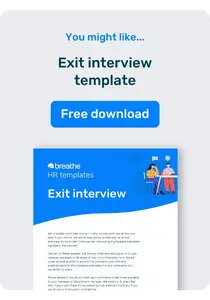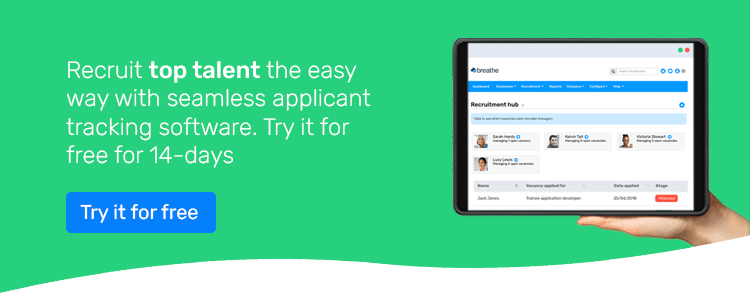Successful companies never want to lose valued members of staff, but in a modern working environment there will always be some who choose to leave. Learn to make this loss productive by carrying out a thorough exit interview.
Correctly implemented, an exit or departure interview can help you gather important information to improve your business strategy, develop company culture and help you retain staff in the future.
Why are exit interviews important
7 key interview questions to ask
What not to ask in an exit interview
Your go-to exit interview process template
Take ownership of your recruitment process
What is an exit interview?
An exit interview is a formal discussion between a company and an employee who's decided they want to leave the business.
You can think of an exit interview as the opposite of a job interview, where instead of asking the individual why they want to join the company, you are getting information about why they are leaving.
At its core, the interview will try to understand why the employee wants to leave, with the objective of collecting information to prevent it from happening again.
Why are exit interviews important?
If done well and properly, exit interviews can give you great insights into your business and help with employee engagement and satisfaction. It’s also a chance to hear from a more honest staff perspective – after all you’re highly unlikely to get such frank answers from current employees.
The purpose of an exit interview
In addition, recruiting and training staff can be an expensive business and if you’re experiencing high staff turnover, then something isn’t working properly. Exit interviews are a good way to discover what the problem is and to fix it. It may be too late for employees who are already leaving but it can help you put in place a strategy to reduce your staff turnover and ultimately bring down costs.
They can also add value to your company culture and staff performance. With exit interviews, or anonymous exit questionnaires, you can start to identify trends which, in turn, can inform your overall company strategy and the way you’re perceived as an employer. They can help you repeat good experiences for other employees and help you avoid repeating the bad ones in the future.
An exit interview gives you a chance to better understand the reason behind an employee choosing to leave your company, giving you an opportunity to correct it and prevent any further loss of staff.
You may find that staff in these interviews are more honest and forthcoming when offering feedback than those who remain under your employment.
It’s vital that you always approach an exit interview in a positive manner. Remember that it’s also a great opportunity to ensure the relationship with your employee is left on a positive note. You never know, they might want to come back one day...
7 key exit interview questions to ask
To make the most of your next interview, try out these questions to get a clearer picture of why they are leaving.
-
Why did you start looking for a new job?
Asking this question will help you understand the specific cause for the employee looking for new work. This could be a personal reason (closer to family) or there could have been an incident they feel wasn’t resolved correctly. -
What circumstances led to you accepting the new position?
This question will help you understand your company in relation to the one the employee is leaving you for. If they are leaving for higher pay, or a greater range of benefits, it will give you evidence that you may need to work on how your company sells itself. -
Did you feel that you had the tools to do your job well?
This will help you get a better idea of how well employees feel they can carry out their daily tasks. There might be technical issues you’re not fully aware of, or training you’re not providing. The answers to this question will be essential going forward. -
How would you describe the company culture?
By asking this question you will be able to start identifying worrying trends when it comes to your company culture. Although you will find some personal gripes, if the same things keep recurring, this is a clear sign that there are areas you need to tackle. -
What could we have done to keep you here?
A simple and straightforward question such as this may give direct insight into what your company could be lacking. By collecting this information from every outgoing employee, you can build a plan of where to improve.
-
Did you discuss your reasons for leaving with anyone at the company prior to resigning, such as your manager?
As an employer you want to create a positive company culture where employees feel safe to discuss their grievances with their superiors. By asking this question, you can identify if this is happening or not. -
How can our company improve training and development programmes?
This question can be asked as a direct result of specific feedback. If outgoing employees consistently mention a lack of development or training as a reason for leaving, this question can help you identify training opportunities for other staff in the immediate and long-term future.
What not to ask in an exit interview
One of the most important aspects of conducting an exit interview is not to ask leading questions, as these can cause the interviewee’s answer to be influenced by your question. This won’t help you collect the broad range of information you need to improve. Avoid asking leading questions, such as:
-
Are you leaving because of a particular person?
-
Is there something you don’t like about the company culture?
-
Were you unhappy with the lack of career advancement opportunities?
Overall, it’s important to think of the exit interview process as the employee’s opportunity to provide healthy feedback, based on their personal experience. It should not be influenced by any presumptions you may have.
Your go-to exit interview process template
Before conducting an exit interview, it is best to get the process right. A process template will help you make sure all the correct topics are covered, consistency is always maintained, your conversations remain productive, and everyone is appropriately prepared.
Exit interviews are a valuable tool but they need to be carried out correctly if you want to get the most out of them. You also need to be prepared to hear some potentially very frank answers. Remember, some people may want to vent.
Choose the right time to conduct the interview
When it comes to conducting an exit interview, communicate with the outgoing employee when it is best to conduct the interview. Pick a time which suits both of you. This way, everything can be discussed without worrying about any time constraints.
You will want to collect as much information as possible and this could take time.
It’s always best to conduct an interview face to face. You can ask for written feedback from an employee but they might be a little less frank if you’re asking them to fill in a questionnaire.
Schedule any meeting at the very end of your employee’s notice period or contract end, normally just a few days prior to that date. And, where possible, have someone who isn’t your employee’s direct line manager conduct the interview. It’s also good practice to let them know they don’t have to answer all your questions and to ask if they mind any information being shared with other management.
Choose a method of how you want to conduct the interview
There are two common ways of conducting an exit interview. In one scenario you can simply talk through your questions. Alternatively, you can provide a written form that an employee can complete.
You can choose either of these methods, or you can choose to combine both where you provide the employee with a form to fill out then discuss their answers.
To make sure you get a strong overall picture try and group your questions into these five categories:
The reason for leaving
-
Job circumstances
-
Your company culture
-
The working environment
-
Technology and tools for the job
If you are struggling for questions, have a look at our examples and adapt them to fit your organisation.
Conduct the interview
Once you have set up the meeting and chosen your method, it's time to conduct the interview. Let the employee know they can have another member of staff to accompany them in this process.
You will want the interview to flow as naturally as possible and let the employee feel comfortable in expressing themselves. Try to be as positive as possible, avoiding leading, negative or accusatory questioning.
Review collected data
Once the interview is complete and you have said goodbye to the departing employee, review your data. See if there are any trends and keep it to compare with any outgoing employees in the future.
It is best not to act upon the feedback of just one employee, unless it is urgent. Keep collecting answers from your exit interviews to build a bigger picture of where you need to improve, then create an action plan to start making changes where needed.
Download our free exit interview process template for further support with exit interviews.
Take ownership of your recruitment process
Use Breathe to take full ownership of your recruitment process, from start to finish.
Easily post vacancies on your website and track your recruitment process all the way through—from initial interviews, right up until your new starter booking their first holiday, and beyond
Author: Andy Stewart





